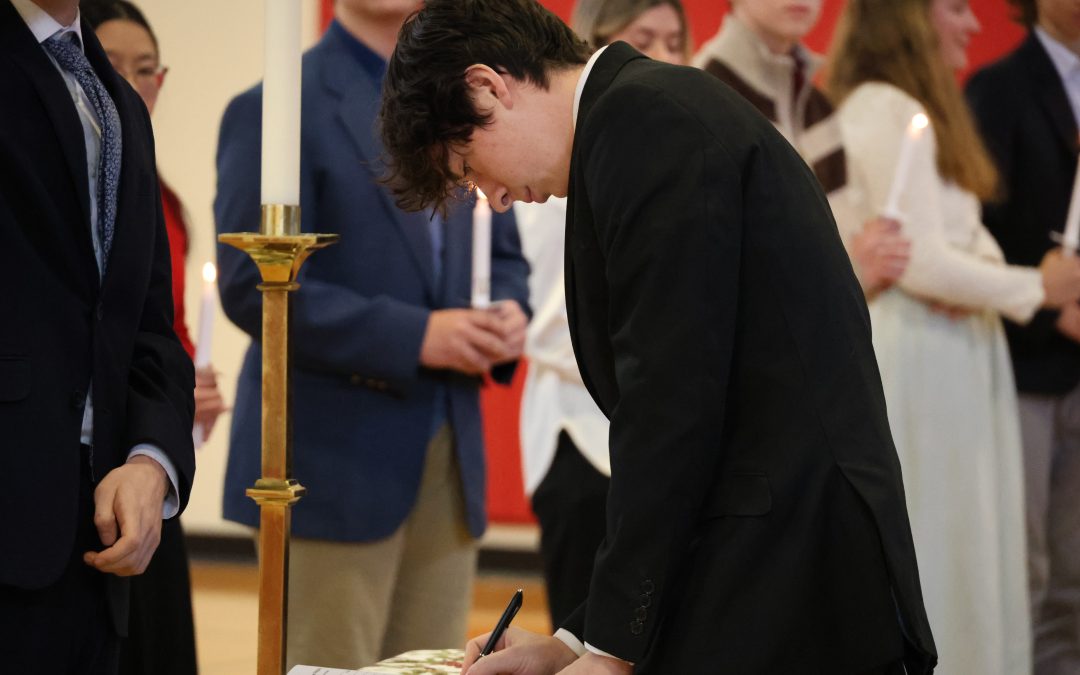
“Frost and chill, bless the Lord,
Ice and snow, bless the Lord.”
– Daniel 3: 69 – 70
Winter is not my favorite time of the year. Unlike the three young men in the fiery furnace (Daniel 3) I often neglect to bless the Lord for frost, chill, ice, and snow. I tend to plod along through the winter, counting the days until spring.
The festivities of Christmas are long past and liturgically we find ourselves in “ordinary time.” It might be natural to think of ordinary time as a bleak, boring season in the church, but that is not what ordinary time is about.
During my training in Catechesis of the Good Shepherd, I heard ordinary time described in a way that made beautiful sense to me. Speaking of the liturgical colors (this was a lesson geared to 3-6 year olds) our instructor taught us that “green is the growing time.” Ordinary time, when altars and priests are dressed in green, is not a boring time, it is an opportunity for growth, which, if lived properly, can produce marvelous fruit.
In the absence of celebrations or special observances, there is a quiet cadence to the liturgy and our personal prayer time. This is time to narrow our focus to God; time for real growth. This is the beauty of ordinary time.
The school calendar reflects the liturgical calendar in that we have entered a stretch of time where we can narrow our focus and dig deep into the curriculum.
This time: winter, ordinary time, concentrated school time, where we must keep putting one foot in front of the other reminds me of a story I heard years ago:
Once upon a time, there was a man who was sleeping at night in his cabin when suddenly his room filled with light and the Saviour appeared. The Lord told the man He had work for him to do, and showed him a large rock in front of his cabin. The Lord explained that the man was to push against the rock with all his might. This the man did, day after day. For many years he toiled from sun up to sun down, his shoulders set squarely against the cold, massive surface of the unmoving rock, pushing with all his might. Each night the man returned to his cabin sore and worn out, feeling that his whole day had been spent in vain.
“Lord,” he said, “I have laboured long and hard in your service, putting all my strength to do that which you have asked. Yet, after all this time, I have not moved that rock a half a millimeter. What is wrong? Why am I failing?”
To this the Lord responded compassionately, “My child, when long ago I asked you to serve me and you accepted, I told you that your task was to push against the rock with all your strength, which you have done. Never once did I mention to you that I expected you to move it. Your task was to push. And now you come to me, your strength spent, thinking that you have failed. But, is that really so? Look at yourself. Your arms are strong and muscled, your back sinewed and brown, your hands are calloused from constant pressure, and your legs have become massive and hard. Through opposition, you have grown much and your abilities now surpass that which you used to have. Yet you haven’t moved the rock. But your calling was to be obedient and to push and to exercise your faith and trust in My wisdom. This you have done. I, my child, will now move the rock.”
Ordinary time is the time to push against the rock. It is important to continue doing the right thing, praying the prayers, working hard, even when (or especially when) you cannot see the benefit of your hard work. The change occurs, not necessarily in the circumstances surrounding us (the rock), but in ourselves as we grow stronger, more selfless, more committed to Our Lord and the work he asks of us.
The secular world would call this grit. As Catholics, we refer to it as the virtues of perseverance and fortitude. It is also considered an indicator of academic success. I would be so bold as to say it also indicates success in life. Understanding the value of hard work and stick-to-it-iveness when results are not readily apparent, or when the task seems unending requires a strong moral compass; a compass that has the ability to lead a person through difficulties and keep them heading toward their “true north” – the objective Truth who is Jesus Christ.
Just a couple of weeks ago, our students were pushing hard against the rock – it was midterm week. On Friday of that week, I noticed the students’ faces as they exited the building at dismissal. They looked exhausted, having “labored long and hard” on their exams. They do not see the growth in themselves, but growth has certainly happened. I watched a student, who would not consider himself academically motivated, write two pages without pausing on a midterm essay. I had the privilege of reading an essay written by a tenth grader that would rival any college-level work. Even in the Garden, I encounter children who were so shy in September that they barely spoke, who will now run up to give me a hug and chat. Or, elementary children who are cheering because they “get” to do long division. Growth is happening. It is beautiful and it is exciting.
Mr. Tremblay and I recently had the opportunity to remind our older students of some basic tasks we ask of them:
-
Be where you are supposed to be when you are supposed to be there
-
Do what you are supposed to be doing when you are supposed to be doing it
-
Fulfill your vocation as student to the best of your ability
Which all loosely translates to: “But your calling was to be obedient and to push and to exercise your faith and trust in My wisdom..”
Spring is indeed on the way, and that makes me happy. But, I do believe the rest of winter is best spent, for me and for all of us, in digging deep, praising God in the frost and chill, and embracing the growth that will happen when we are “obedient and exercise faith and trust in His wisdom.” Then ordinary time will be a time of extraordinary growth.
Mrs. Lisa Sweet, Academic Dean



